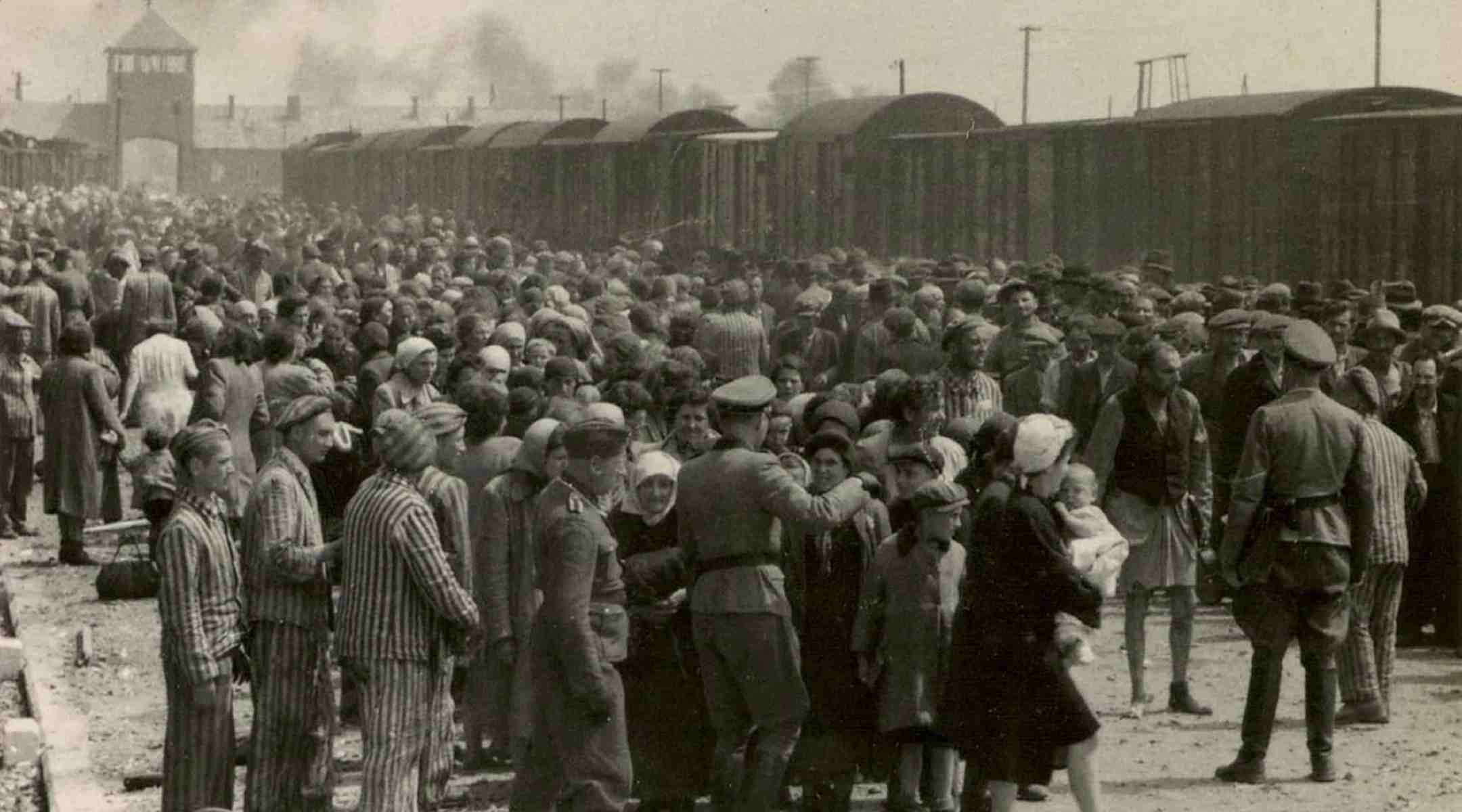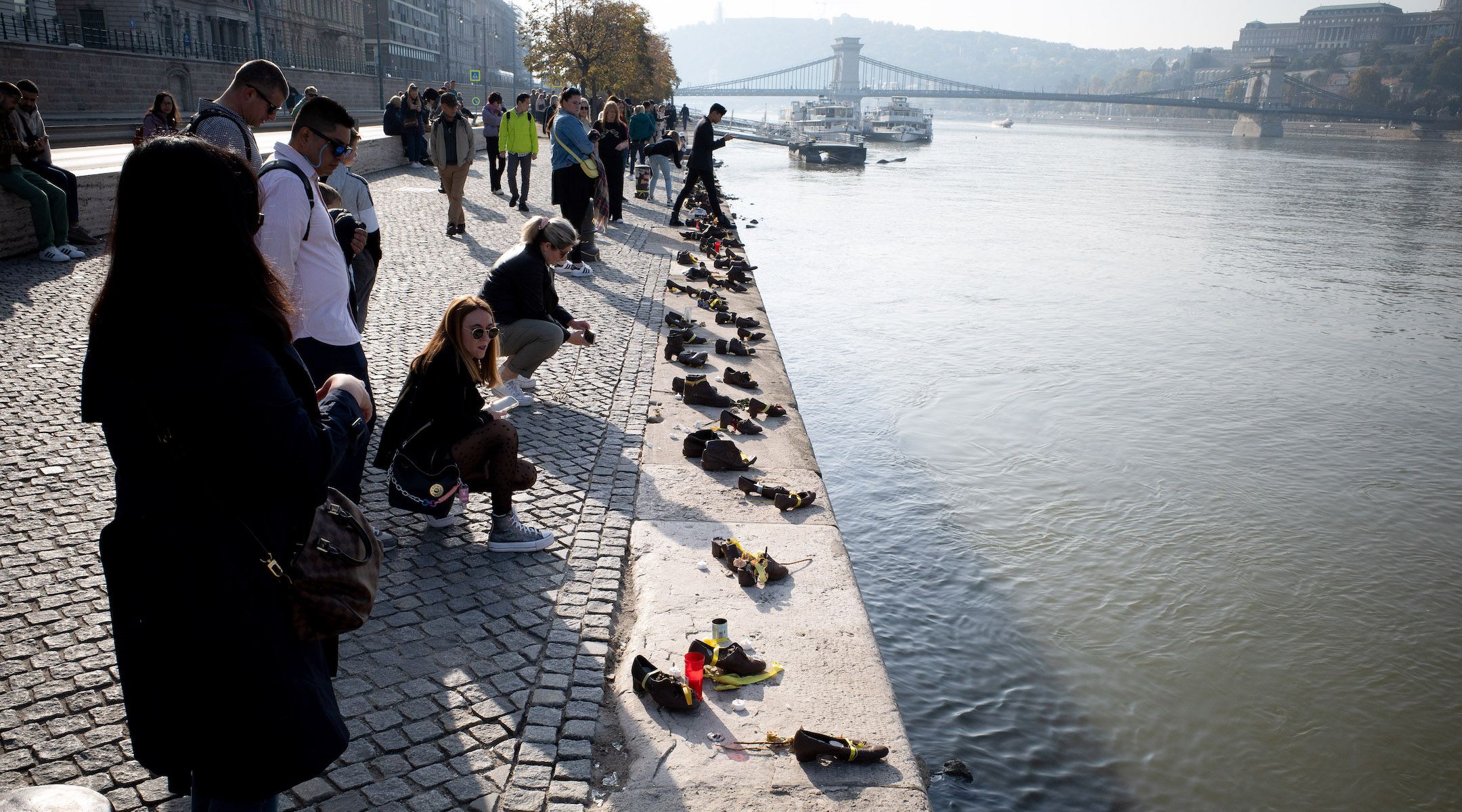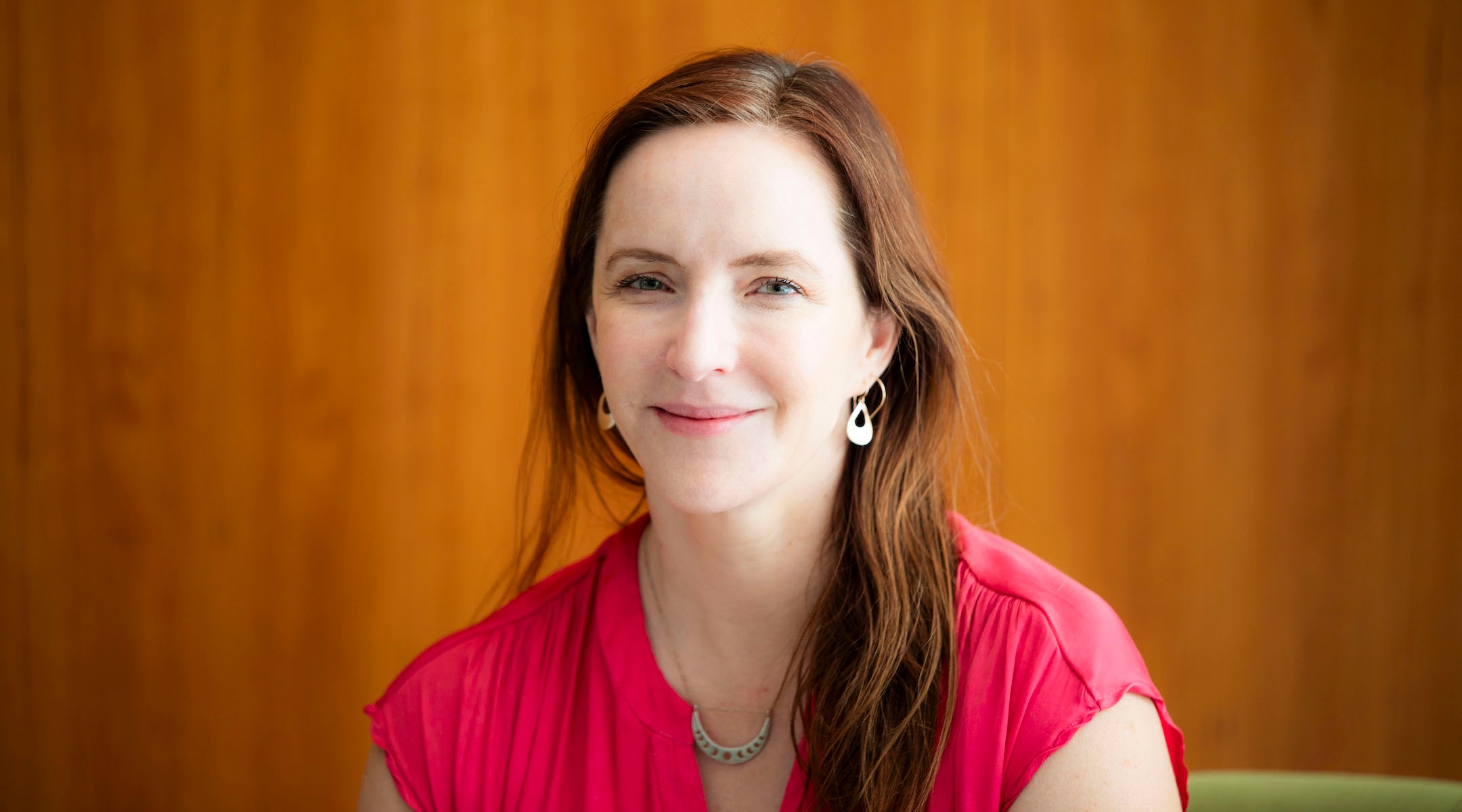Recently the bestselling author Rebecca Makkai revealed the setting of her next novel to fans: It would take place in 1938 and address the rise of Nazi and fascist sympathizers at the time in the United States.
“Something I’ve had to accept, in researching and writing this book, is that many of the people who fell for fascism in the 1930s were neither inherently evil nor idiots,” Makkai wrote to her more than 17,000 Substack readers on Dec. 5 in a post titled “The View From 1938.” She continued, “They were deeply misinformed, and therefore manipulable.”
Makkai went on to explicitly link the themes of her book-in-progress to Donald Trump’s reelection in the present day. “Up until October, people used to be shocked when I told them there was a full Nazi rally in Madison Square Garden in 1939, replete with antisemitic and racist speeches. That was before Trump’s dog-whistle rally, eerily similar,” she wrote. Later, she listed points of comparison between Trump and Hitler.
Makkai is a Pulitzer Prize finalist for her 2018 novel “The Great Believers,” and her most recent book, “I Have Some Questions For You,” spent six weeks on the New York Times bestseller list. Her assistant told the Jewish Telegraphic Agency that the book, still in progress, would come out in 2026.
But while Makkai portrayed her latest effort as timely, her choice of material has raised eyebrows. That’s in part because her announcement didn’t mention that her grandfather, Janos Makkai, was a prominent Hungarian ethnonationalist politician who helped write the 1939 laws that excluded most of the country’s Jews from public life. The journalist and essayist Emily Fox Kaplan also took Makkai to task for alleging that Israel is targeting journalists in Gaza, which she called a present-day version of age-old antisemitic ideas.
The objections tap into two broader debates in the literary world: one about who gets to tell which stories, and another about the acceptable limits of Israel protests in cultural institutions where Jews say they have been made to feel unwelcome. Makkai’s recent participation in a fundraiser for a group fighting antisemitism in the arts space hasn’t insulated her from criticism.
“In your essay, this essay that devoted paragraph after paragraph to Hitler’s hatred of ‘the other’ without once specifying who, exactly, that other was, you write that your aim in delving deeply into this period of history is to examine the ways that history repeats itself,” wrote Kaplan, whose work has been published in Guernica, The Atlantic, The New York Times and other outlets, in an open letter titled “Hey Rebecca Makkai, I have some questions for you.”
“So it’s noteworthy, then, that you have made not a single statement about the fact that antisemitism is surging to levels not seen since the 1930s, when your grandfather wrote Hungary’s Second Jewish Law,” Kaplan added, saying that Makkai’s allegation that Israeli is targeting journalists is an example of “contemporary manifestations of the ancient blood libel, the idea that Jews ritually kill innocents in a quest for power and domination.”
Janos Makkai, Rebecca’s paternal grandfather, was a member of Hungarian parliament who authored and promoted the country’s Second Jewish Law of 1939. The Jewish laws were modeled after the Nuremberg Race Laws and were enacted years prior to Nazi Germany’s 1944 invasion of Hungary.
He was “a rising star politician on the authoritarian and racist right that was in power in inter-war Hungary,” Ferenc Laczó, a professor of European political history at Maastricht University in the Netherlands and author of “Hungarian Jews in the Age of Genocide, An Intellectual History, 1929-1940,” told JTA. Laczó continued, “János Makkai in fact played a leading role when discriminatory laws against Hungarian Jews were introduced in the late 1930s.”

Selection of Hungarian Jews on the ramp at Auschwitz-II-Birkenau in German-occupied Poland, May/June 1944, during the final phase of the Holocaust. Jews were sent either to work or to the gas chamber. (Universal History Archive/Universal Images Group via Getty Images)
The laws defined who counted as Jewish in Hungarian society; defined Jews as a race, rather than as a religious group; and placed Jewish quotas of 6% in professional roles. Subsequent stricter antisemitic laws culminated in the deportation of nearly a half-million Hungarian Jews to Nazi death camps. An estimated 565,000 Hungarian Jews — nearly 70% of the country’s Jewish population — were murdered in the Holocaust.
Janos survived the war, moved to the United States (“by talking his way through a checkpoint,” Rebecca has remarked), changed his name and lived out his last decades in Hawaii, where, Rebecca said in 2013, “until a few years ago, I had the impression that he was a bit of a hero.” His son Ádám Makkai, Rebecca’s father, remained in Hungary with his mother but also fled to the US after participating in the 1956 failed Hungarian Revolution, later becoming a globally renowned linguist. On social media, Rebecca Makkai today refers to herself as the “daughter of a refugee,” and recently wrote of her father, “He was a complicated and fascinating person.”
Makkai has written and spoken about her grandfather before, most notably in a 2013 essay titled “Other Types of Poison” and an accompanying interview in Harper’s magazine that touched on his background. The essay, and her comments about it, focused largely on her grandmother Rozsa Ignacz, a Hungarian leftist writer, actor and activist whom Makkai said hid Jews from the Nazis and would disguise herself as a Jew to visit actor friends in ghettos during the war. (The two were first cousins and only briefly married, Makkai said, adding, “Of course I’d rather own her legacy than his.”)
But Makkai did ruminate on her grandfather in the essay, without ever quite condemning him. “I am told that he did feel remorse. That he never imagined those laws to be a red carpet for Eichmann. That he regretted the turns things took. That, for whatever it’s worth, he never meant to hurt anyone,” she wrote. “I suppose it’s worth precisely nothing.”
To Laczó, Makkai’s choice of subject given her grandfather’s background was curious.
“Rebecca Makkai has publicly recognized, though — as far as I know — has not extensively discussed [her] grandfather’s complicity in the persecution of Hungarian Jews,” he wrote in an email. “Her recent announcement on Substack makes me believe that she will suggest the direct comparability of Nazism in Germany and Trumpism in the US today, which I consider not a particularly judicious historical comparison — and a rather blunt political statement.”
The historian also took issue with “the emphasis on misinformation and gullibility” in Makkai’s book announcement — and suggested that it could be seen as a way to excuse her grandfather’s actions.
“There were many, way too many fascist believers in Europe in the late 1930s and the persecution of Jews across Europe was driven forward by convinced antisemites, like her grandfather and numerous others,” he wrote. “Without meaning to impute bad intentions to the writer, it strikes me that her emphasis on how ‘good and smart’ people fell for fascism can be a way to avoid speaking more directly and critically about the responsibility that actors like her grandfather had for legal discrimination and persecution that soon culminated in mass crimes against Jews and others.”
In conversation with Jewish writer Davis Schneiderman in 2013, Makkai said she had initially been told that Janos had been “coerced” into writing the antisemitic laws, comparing him to “Rolph from ‘The Sound of Music’” (a teenaged Austrian romantic interest from the musical and movie set in the Nazi era who quickly joins the Nazis after they invade the country, but ultimately allows the Von Trapp family to continue their escape).
After doing her own research, she said, she’d been obligated to revise that opinion of Janos: “He’d been upset about the influx of Jewish refugees, which is what led to his political initiatives.”
Two years later Makkai published a short story collection, “Music for Wartime,” which includes stories that deal with World War II, the Holocaust and its effect on Central Europe. The book received mixed reviews, with The New York Times calling it “self-conscious high-mindedness” in a pan. Her follow-up was “The Great Believers,” a deeply researched account of the HIV/AIDS epidemic in Chicago, which won rave reviews, skyrocketed her career and led to her becoming a literary authority on how to sensitively write about a community that is not one’s own.
In her limited public communications so far about her upcoming novel, Makkai has not mentioned her grandfather, nor suggested whether such a history would be incorporated into her book. Her Substack post also did not mention Jews or antisemitism beyond the reference to the 1939 rally. That led Kaplan to announce she was writing an essay of her own in response featuring accounts of Hungarian Jews persecuted by the law drafted by Makkai’s grandfather, as well as the reactions of their descendants to what Kaplan calls Makkai’s “pattern of behavior.” Kaplan put out calls for such stories in Jewish writers’ groups and elsehwere.
Publishing history is awash with books on the Holocaust written by the descendants of Nazis and their collaborators, including many tomes from German and Polish authors. In recent years, the author’s wrestling with such family relations is often the hook of these books.
Journalist and Harvard University fellow Linda Kinstler, in her prizewinning 2022 book “Come To This Court & Cry,” reports that her grandfather was a participant in a Latvian killing unit during the Holocaust, while also serving as a secret agent for the KGB (her mother’s side of the family are Soviet Jews). German-Nigerian author Jennifer Teege had an international bestseller in 2015 with “My Grandfather Would Have Shot Me,” her memoir (co-written with Nikola Sellmair) about being the Black granddaughter of the Nazi commandant depicted in the film “Schindler’s List.” The book followed a similar memoir by her own mother.
And the journalist Nina Munk has directly tackled her own family’s Hungarian Holocaust history, having translated and edited the memoir “How It Happened: Documenting the Tragedy of Hungarian Jewry” by her relative Ernő Munkacsi, who was the secretary for the Hungarian Judenrat — a council of Jews who worked with the Nazis.

The Shoes on the Danube Bank Monument in Budapest, Hungary, on October 27, 2024. The composition commemorates the 3,500 people, 800 of them Jews, who were shot into the Danube during the time of the Arrow Cross, a Nazi-aligned party that briefly ruled Hungary from 1944-45. (Nikolas Kokovlis/NurPhoto via Getty Images)
It remains to be seen whether Makkai will choose such a path. But Kaplan suspects she won’t.
“Those of us who have studied the ways antisemitism functions across time and space find it chilling, but not surprising, that the granddaughter of the man who wrote Hungary’s Second Jewish Law of 1939 has chosen to use her enormous platform to spread an ancient blood libel against the Jews — while identifying as a social justice-minded student of the ways that history repeats itself,” Kaplan wrote in a statement to JTA.
Kaplan was also one of several voices publicly criticizing Guernica magazine earlier this year when — in response to left-wing backlash — it pulled an Israeli writer’s essay about coexistence.
In her open letter to Makkai, Kaplan explained that by “blood libel” she was referring to Instagram posts by Makkai in which the author, directing her comments at the literary free speech group PEN America, accused Israel of targeting specific journalists with bombs in Gaza. Israel has denied it is intentionally targeting journalists in its military campaign, which the Hamas-run Gaza health ministry says has killed more than 45,000 Palestinians, following the Hamas attacks that killed 1,200 Israelis, took hundreds of hostages and launched the war.
Makkai directed her audience to donate to a group called International Media Support, which aids journalists in Gaza and says more than 120 journalists have been killed there in “relentless attacks” by Israel.
Through her assistant, Makkai declined to comment further, saying she would discuss her novel in more detail upon its release. Yet even as the author has been coy about how Jews and antisemitism will factor into her book, she has shown support for an effort opposing antisemitism in the cultural space.
She participated in an auction this year held by Artists Against Antisemitism, a new advocacy group formed in the wake of Hamas’ Oct. 7, 2023, attack that focuses on Jewish support in the literary space. The group has raised awareness of Jewish authors who have been shunned from organizations or events over their real or purported “Zionism.”
In the fundraiser, Makkai auctioned off naming rights to a “minor character” in her new book, which the auction description noted “explores antisemitism in the U.S. in the 1930s.” The name, the instructions said, “would have to be a name that could exist in either Germany or the US in 1938.” Makkai’s item, which found an undisclosed bidder and sum, was available for bidding alongside other perks centered around figures such as Chelsea Clinton or Jimmy Fallon, as well as outspoken pro-Israel celebrities such as Mayim Bialik and Julianna Margulies.
“We’re glad that Rebecca Makkai made the choice to stand with us against hate,” the executive board of Artists Against Antisemitism told JTA in a statement, adding that the auction description was jointly written by the author and the organization. “Having not read the manuscript of her new book, we can’t comment on its content, nor can we speak to Rebecca’s reason for writing it.”
In her open letter, Kaplan said it would be a failure of Makkai’s to write a novel about the Holocaust without mentioning or speaking to Jews. “I wonder if you would have published an essay about the Civil War that doesn’t mention slavery. And whether if you had, and Black people had reacted with horror, you would have ignored them,” she wrote. (Kaplan told JTA she had reached out to Makkai about her concerns but that the author blocked her on social media.)
Regardless of whether Makkai writes about her grandfather in her new novel, in 2013 she expressed a desire to write more about him one day.
“One of these times, if I get the words in the correct order, if I retrace more precisely the lines of history, I am convinced I will learn something I need to know,” she wrote. Then, later, referring to her grandparents: “I want to write more about both of them. There’s obviously a lot I haven’t figured out yet. And I think that’s always a good reason to write about something.”
JTA has documented Jewish history in real-time for over a century. Keep our journalism strong by joining us in supporting independent, award-winning reporting.






